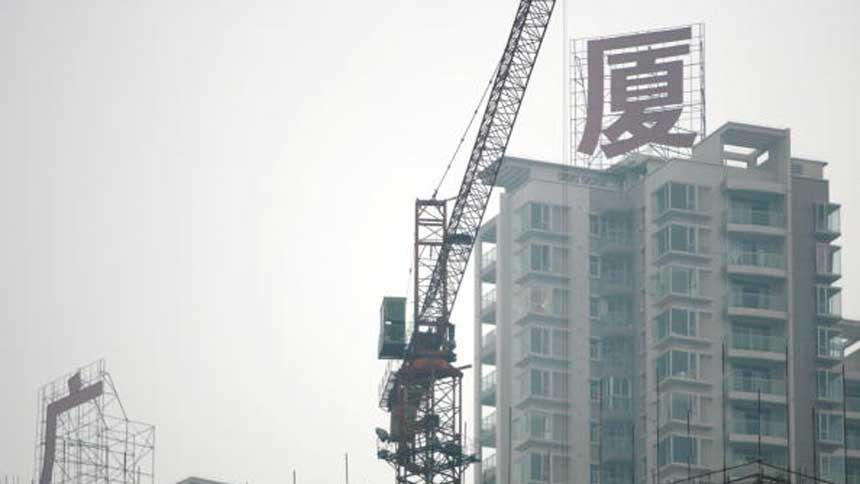China’s Real Estate Bubble Bursts as Cities Cancel Building Price Restrictions
September 28, 2023
In a comprehensive report by reporter Li Hui, it has been revealed that many cities in China have lifted the building price restrictions that were strictly controlled two months ago. This move has led the outside world to believe that China’s real estate bubble has burst and a housing market storm is forming, with unpredictable consequences.
The bursting of the real estate bubble can be traced back to January 2021 when the Chinese Communist Party (CCP) implemented the “three red lines” policy to limit the high-debt expansion of real estate companies. Companies like Evergrande faced strict financing restrictions and experienced liquidity problems. In September 2021, Evergrande’s financial crisis triggered the start of China’s real estate bubble collapse.
The crisis quickly spread, with many developers defaulting on their debts, sales of new homes plummeting, and construction sites coming to a halt. To increase liquidity and sell properties quickly, some real estate developers resorted to selling houses at discounted prices.
However, this practice led to punishment for a real estate company in Kunshan, Suzhou, which was fined for selling houses at a 30% discount. The penalty was based on the “limitation order” issued in 2021. In the same year, 21 cities in China imposed “price limit orders” that restricted the selling price of new homes to no less than 90% of the registered price, with a minimum of no less than 85%.
In an attempt to attract buyers, many real estate companies introduced “gift-for-purchase services” and even offered disguised discounts through private cash returns or other forms of remuneration.
However, the Chinese people, who have a mindset of “buying up and not buying down,” adopted a wait-and-see approach, further exacerbating the crisis. The collapse of the real estate bubble severely impacted China’s economy, resulting in a sharp increase in unemployment. The number of second-hand house listings surged, and “free houses” advertisements even appeared.
To rescue the housing market, the Communist Party of China introduced several policies, including the removal of restrictions on the purchase of first and second homes, as well as lowering bank loan interest rates.
On August 20, China Real Estate News, a newspaper affiliated with the Ministry of Housing and Urban-Rural Development, published an editorial urging local governments to cancel the price limit policy. The editorial argued that developers should have greater independent pricing power and be allowed to reduce prices to collect funds quickly.
Following this, Chengdu City in Sichuan Province lifted the price limit on new construction projects in the city center and canceled the government-guided price for second-hand housing sales. The Wall Street Journal reported that at least a dozen cities have recently relaxed housing price restrictions to some extent.
It is important to note that even under the CCP’s “limitation order,” some developers attempted to sell at reduced prices, but faced protests from existing homeowners.
The falling housing prices have grave implications for the Chinese public. As of 2019, the home ownership rate among Chinese urban households was approximately 96%, and for many, a house represents their largest financial asset. The decline in house prices has resulted in shrinking equity for homeowners, potentially leading to conflicts between the government and the public.
Economists quoted by the Wall Street Journal express uncertainty about the extent to which housing prices will fall if the price floor is lifted on a wider scale. China has not experienced such a severe downturn in the housing market before, but any decline in prices will bring significant risks.
In a September report, ANZ Bank warned that a sharp decline in housing prices, leading to fire sales and a downward spiral in the market, could endanger the stability of the financial system.
Recent data from the Statistics Bureau of the Communist Party of China reveals that as of the end of August, there was a total floor area of 648 million square meters of unsold houses in China. Based on an average house size of 90 square meters, this is equivalent to 7.2 million unsold houses. This figure does not include incomplete residential projects due to cash flow problems, nor the many vacant homes purchased by speculators during the market improvement in 2016.
He Keng, former deputy director of the Statistics Bureau, addressed the oversupply issue at the “China Real Economy Development Conference” held in Dongguan. He stated that China currently faces a serious oversupply of buildings, with vacant properties scattered across the country. He also emphasized that the long-term and structural problems facing China’s economy are mainly related to the real estate and debt crises.
As uncertainty looms over China’s housing market, the cancellation of building price restrictions raises concerns about the future stability of the real estate sector and its impact on the overall economy.
Editor in charge: Lin Li
